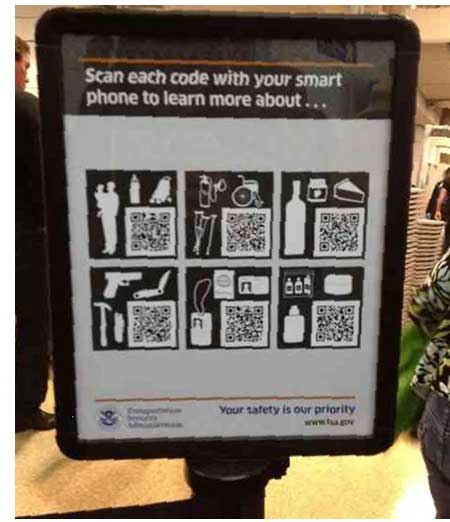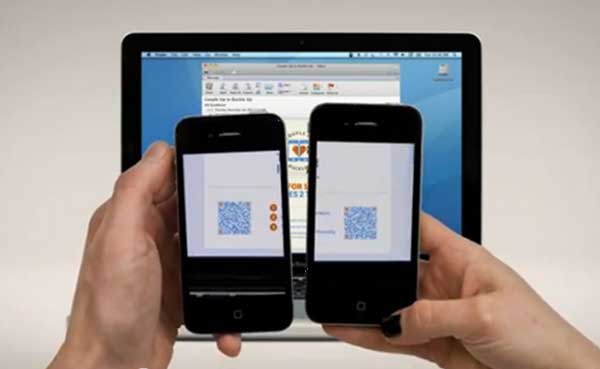Designed as a high-tech marketing resource, QR (quick response) codes have many useful applications. These (usually) black-and-white algorithmic codes are gateways to a potential multimedia nirvana. When used correctly, QR codes are marketing marvels.
In the world of QR codes, however, the sublime often coexists alongside the ridiculous.
Improper Ways to Use QR Codes for Marketing
Perhaps the relative novelty of QR codes has some companies a little confused about which best-practices to adopt. Subway—the international sandwich maker—created shirts with massive codes on the back of the T-shirts. The question arises: When are those QRs going to be scanned, considering that we communicate face to face?
Often, companies are so excited about using QR codes as part of their marketing campaigns that they forget the basic rules of the game.
These codes were designed expressly to simplify the marketing message, not to complicate it. Convoluted marketing messages detract from the effectiveness of using the QR code in the first place. Rambling lists of instructions and bullet points to get your message across are a definite no-go. Simplicity and appeal trump instruction-laden advertisements.
Companies that don't understand the true marketing potential of this resource run the risk of losing out on its potential for getting their messages across to customers. Many marketing departments are loath to embrace this technology and hope that it will simply go away.
QR codes are here to stay, and the sooner their untapped potential is understood, the better for everyone.
10 of the Worst Real-World Examples of QR Codes in Action
- QR codes in subway tunnels around the world may appear to be a good idea, but if they are too far away, or trains are moving too quickly, their message is lost on passengers who don't have time to scan them properly. Moreover, passengers may not have cell signals in subways.
- QR codes should be placed in an easy-to-scan location. If they are too high up (on buildings, for example), their message is lost on passers-by.

- Improper use of QR codes occurs at airports, where lists of prohibited items are associated with codes for the purported benefit of passengers. It almost seems as if people are so eager to use QR codes that they use them merely for the sake of using them.
- Some sports companies are attaching QR codes to bikinis, in the hopes that more people will see their marketing message. This may well prove to be an effective marketing mechanism, but it's not the QR codes that people are really interested in, is it?
- Redundancy is yet another trap that many companies may fall into when adopting QR codes in their marketing campaigns. For example, Bank of America attached a QR code that links directly to its website—from its Facebook page…
- There was even an instance of a dog owner posting a picture of his lost Dalmatian with a QR code juxtaposed over the Dalmatian. This failed for two reasons: the spots on the Dalmatian confused the QR code message, and it is ineffectual for the purposes of finding the dog: A simple telephone number would suffice.
- Believe it or not, certain grocery stores use QR codes to replace barcodes on individual items, such as bananas.
- Though it might seem like a good idea, it is probably not in good taste to put a QR code on your loved one's tombstone.
- Barcodes tattooed onto your body... Enough said!
- Moroccanoil Inc. included a QR code on its product, but there was one problem: The QR code was one-eighth the size of a US quarter.
The Proper Use of QR Codes
QR codes are most effective when they form an integral part of a marketing message that is appealing, engaging, interactive, and unique. There is also a movement toward making the visual appeal of the QR code more enticing so that users, passers-by, and potential customers are more likely to stop, scan, and enjoy the multimedia message that the QR code has in store for them.
QR code success stories abound, in categories from lifestyle to leisure, entertainment, food and drink, promotions, events, information, and beyond. Take a look at the following QR code samples.
10 Great Ways to Correctly Use QR Codes
- Lifestyle companies such as Macy's, JC Penney, and Tesco are some of the most notable success in QR codes marketing. These companies find inventive ways of incorporating QRs into their marketing messages to entice customers to scan and enjoy the benefits.
Tesco's for example, became the second biggest retail grocery chain in South Korea (changed its name to Home Plus)—not by expanding the number of stores, but by including codes on posters in subway stations, train stations, and sidewalks, allowing people to order groceries, on the spot. - Restaurants are cashing in on QR codes too—just ask The Melt, famous for its grilled cheese sandwiches. Customers can easily scan QRs that will then automatically get their food on the grill while they are being seated.
- Universally popular names such as Taco Bell and Mountain Dew used QR code campaigns on their drink cups, with many free music downloads available to those who scanned them. In total, some 200,000 downloads resulted from this successful campaign.
- THQ Homefront is a videogame that uses QR codes throughout the game for players to unlock exclusive, never-before-seen content. Within two days, some 30,000 codes were scanned.
- Leonardo DiCaprio's film Inception also made use of QR codes to ramp up the sense of mystery and hype around the movie. Flyers, T-shirts, and posters promoting Inception contained codes that led to a fake website named What Is Dream Share?
- Google's Favorite Places marketing campaign earmarked 100,000 places to visit in the USA. Those top businesses each got a window decal with their QR code on it. Passers-by could then scan the code for a wealth of information on the business.
- The Florida State Law Library uses QR codes in its books to help link them to other electronic resources.
- A restaurant in Washington DC named Policy uses QR codes in its window, by the menu box. Patrons and passers-by can scan the QR codes, taking them to the online menu or allowing them to make reservations.
- vCard electronic business cards are great way to use QR codes to add rich multimedia content to traditional business cards.
- Scandinavian Airlines put together one of the most exciting promotions ever; the ad campaign required two smartphones (side-by-side) to scan the QR code to receive the deal. This campaign boosted revenue and got more people to fly together.





